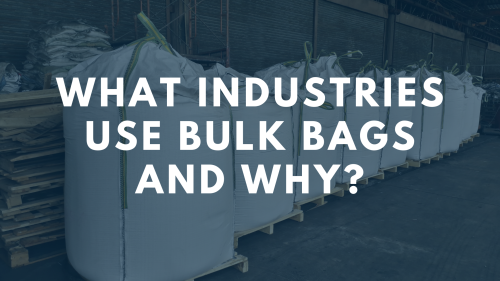What Industries Use Bulk Bags and Why?
Flexible Intermediate Bulk Containers (FIBCs), commonly known as bulk bags, have become essential in a wide range of industries for transporting and storing dry bulk materials. Their durability, cost-effectiveness, and ease of handling make them ideal for companies moving powders, granules, or pellets.
Understanding which industries rely on bulk bags—and why—can help you determine whether an FIBC handling system is right for your operation.
Food and Beverage Processing
Bulk bags are widely used in food and beverage manufacturing to store and transport ingredients like sugar, flour, spices, and powdered additives.
-
Sanitary handling features and food-grade liners make bulk bags a safe option for consumables.
-
They reduce manual handling, lower contamination risk, and improve batching efficiency.
Chemical Manufacturing
In chemical production, bulk bags are used to store powders, resins, and granulated compounds.
-
Their dust-tight design helps minimize health and safety risks.
-
Static-dissipative or conductive bag options meet strict handling standards for volatile materials.
Construction Materials
The construction sector often uses bulk bags for materials like cement, sand, grout mix, or crushed stone.
-
The bags offer rugged durability, ease of transport, and minimal waste.
-
Job sites benefit from quick unloading and reduced labor demands.
Agriculture
Farmers and agricultural suppliers rely on bulk bags for seed, fertilizer, and animal feed.
-
Bags allow for easy storage and weather-resistant transport.
-
Compatible with conveyors and feeders for simplified distribution.
Plastics and Resins
In the plastics and manufacturing sector, bulk bags store and deliver plastic pellets, compounds, and additives.
-
Compatible with pneumatic conveying or gravity-fed systems
-
Allow for dust control and reduced material loss during transfer
Why These Industries Prefer Bulk Bags
-
Efficiency – Higher material throughput and faster transfers
-
Reduced Labor – Less manual handling and better equipment integration
-
Cost Savings – Lower packaging costs and reusable containers
-
Safety – Minimizes spillage, contamination, and material exposure
Bulk bags play a key role in nearly every dry bulk material industry. Whether you operate a food plant, a resin facility, or a cement batching line, the right bulk bag unloading or filling system can streamline operations and protect your product.
Contact Erie Technical Systems to learn more about unloading and filling equipment designed for your industry.

